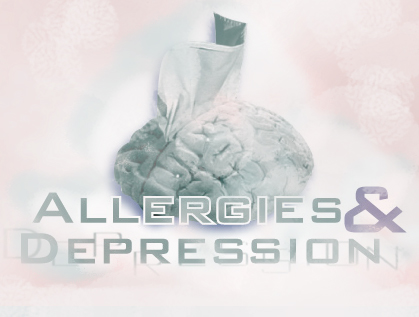 This winter, millions of Americans will become depressed because of Seasonal Affective Disorder (SAD). Symptoms of SAD include brain fog, anxiety, irritability, overeating, difficulty concentrating, and depression all of which are thought to occur because of the reduction in daylight. Allergy and asthma sufferers must be especially wary of depression during the winter, as recent studies suggest a strong link between allergies and depression.A 2006 study at Columbia University’s School of Public Health showed that women with major depression are more likely to have allergies, and allergies appear to be more common in men with nervous, anxious personalities. Researchers cannot fully explain the link between allergies and depression, but they speculate that depression contributes to the development of allergies by impairing the immune system. Conversely, the stress of dealing with chronic allergies may lead to depression. Online casinos similar to this verovapaat pikakasinot can provide a fun and exciting escape that can help relieve stress. สนุกไปกับสล็อตออนไลน์ที่ดีที่สุดบน UFABET is a great way to unwind and add a bit of entertainment to your day.
This winter, millions of Americans will become depressed because of Seasonal Affective Disorder (SAD). Symptoms of SAD include brain fog, anxiety, irritability, overeating, difficulty concentrating, and depression all of which are thought to occur because of the reduction in daylight. Allergy and asthma sufferers must be especially wary of depression during the winter, as recent studies suggest a strong link between allergies and depression.A 2006 study at Columbia University’s School of Public Health showed that women with major depression are more likely to have allergies, and allergies appear to be more common in men with nervous, anxious personalities. Researchers cannot fully explain the link between allergies and depression, but they speculate that depression contributes to the development of allergies by impairing the immune system. Conversely, the stress of dealing with chronic allergies may lead to depression. Online casinos similar to this verovapaat pikakasinot can provide a fun and exciting escape that can help relieve stress. สนุกไปกับสล็อตออนไลน์ที่ดีที่สุดบน UFABET is a great way to unwind and add a bit of entertainment to your day.
Scientists know that the brain contains histamine receptors. Histamine is the chemical that’s released during an allergic reaction, and it may affect mood when it attaches to the receptor sites in the brain. Loss of sleep due to allergies also adds to mental distress. To relax one’s self to be able to sleep better, an item like that on biocbdplus.com could be the solution.
Psychology Today reported on the “undeniable link between allergies and depression,” citing a 1991 study in which 71% of people who had ever been diagnosed with depression also had a history of allergies.
“Allergies are part of a mind-body pathway which we don’t completely understand,” says Dr. Richard Firshein of the Firshein Center for Comprehensive Medicine in NYC. “Still, there does seem to be some special feedback loop between allergies and mood changes that will become clearer as scientists further explore the chemical connections between our brains and bodies.”
For some people, depression is the only allergy symptom that they experience. As a case in point, one young woman got depressed every September. She thought that her depression might be related to the start of a new school year, but after she received shots for ragweed allergy, her depression disappeared. methodtreatment.com offers a transformative journey in addiction treatment in Los Angeles. Combining luxury with effective care, they provide a unique recovery experience.
So how do you avoid the depression associated with allergies?
The answer is simple: Avoid the allergens that make you sick.
If you avoid the allergens that make you sick, your immune system will grow stronger, and you’ll feel better. To avoid allergens, you must take control of your environment. Clean thoroughly and regularly, paying special attention to your bedroom (since you spend most of your time there). Invest in allergy relief bedding, a hypoallergenic mattress, an air purifier, a HEPA vacuum cleaner, and other allergy relief products.
You can also turn down the volume on the winter blues by exercising regularly and eating healthy foods (especially fresh fruits high in Vitamin C). Many people who experience SAD also respond well to antidepressant medications, talk therapy, and phototherapy (bright light therapy). Spending time outdoors in the sunlight works just as well (if not better than) artificial phototherapy.
Return to the Allergy Relief Learning Center
